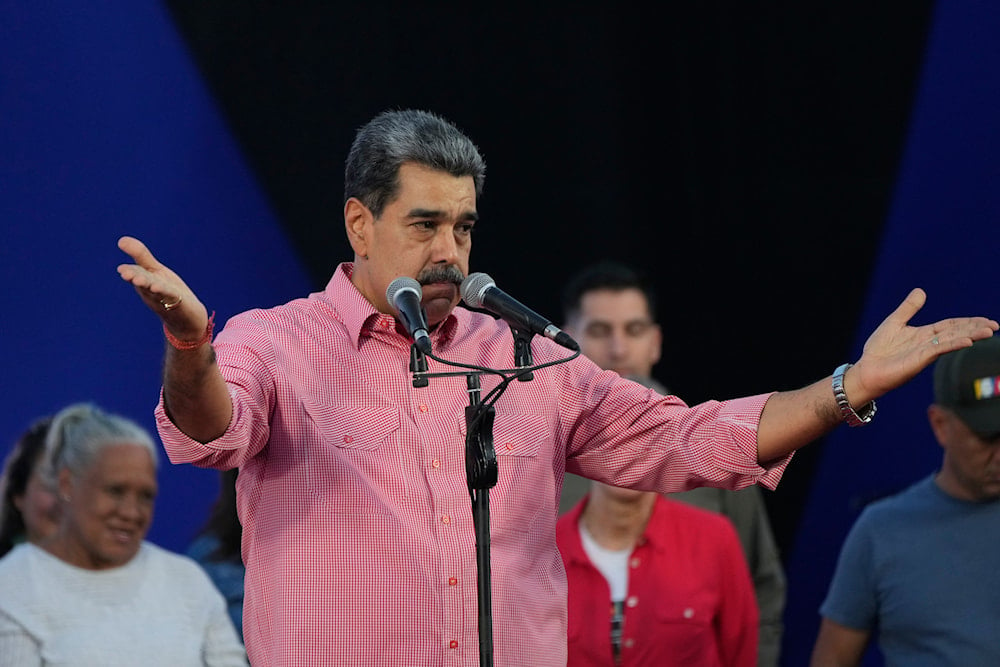Maduro urges US dialogue, warns against military threats
Venezuelan President Nicolas Maduro calls for dialogue with the US, warning against military threats and emphasizing Venezuela’s commitment to peace.
-

Venezuelan President Nicolas Maduro speaks during a state-led civic-military event in the Petare neighborhood of Caracas, Venezuela, on November 15, 2025. (AP Photo/Ariana Cubillos)
Venezuelan President Nicolas Maduro has responded directly to recent comments by US President Donald Trump, emphasizing that dialogue, not war, remains the only viable path forward between the two countries.
Speaking during his weekly televised program, Maduro stated, “Dialogue is the way to seek truth and peace,” adding that “peace, dialogue, and diplomacy have no alternative.” He warned that individuals close to Trump are attempting to push him into making “the biggest mistake of his career by attacking Venezuela.”
Maduro reiterated Venezuela’s openness to engage in dialogue with the United States, stressing that his government is prepared for constructive engagement at any time. "Whoever wants dialogue will always find in us people who are true to their word, respectful, and experienced in leading Venezuela," he said.
Rejecting talk of subversive or military options, Maduro sarcastically asked, “Who would Washington install? Guaidó again? Or 'Guaidó the woman,' [referring to María Corina Machado]?”
He underlined Venezuela’s current stability, asserting that “this country is at peace, and will continue to be at peace,” and welcomed any US representatives willing to engage in face-to-face discussions without conditions.
Venezuelan public firmly rejects war and intervention
Maduro highlighted strong national opposition to foreign interference, stating that 94% of Venezuelans reject war, and over 90% dismiss political figures associated with past destabilization efforts, such as Juan Guaidó, María Corina Machado, and Leopoldo López.
He also noted growing public support for national institutions, saying that 80% of citizens back the armed forces and the People's Militia, and added that overall support for the government has reached “an unprecedented level, approaching 70%.”
According to Maduro, several US media outlets are playing a destabilizing role by promoting the idea of military action against Venezuela, warning that this narrative is being pushed both by Trump’s opponents and by figures within his inner circle who are pursuing personal agendas.
He drew comparisons to past US interventions in Vietnam, Afghanistan, Iraq, and Libya, describing war in the Americas as “an abyss without end.”
In a regional context, Maduro praised the outcome of a recent referendum in Ecuador, in which voters rejected constitutional changes and the presence of foreign military bases. He described the result as “a victory for the Ecuadorian people, Latin America, and the Caribbean.” He added that the region is clearly voicing its opposition to “the pro-war colonial military bases of the United States.”
Earlier, Trump acknowledged that opening communication channels with Venezuela was under consideration, noting that Venezuela appeared ready for dialogue.
Venezuela-US tensions
Recent tensions between Venezuela and the United States have dramatically intensified due to a major escalation in US military operations, sanctions, and covert actions in the Caribbean region. The US has deployed destroyers, surveillance aircraft, and special forces near Venezuelan shores, officially under the pretext of counter-narcotics efforts; however, Caracas sees these maneuvers as acts of aggression aimed at regime change and the seizure of Venezuelan oil assets.
Venezuelan Defense Minister Vladimir Padrino López has accused Washington of using excessive force without legal justification and warned that these actions are fostering instability not only in Venezuela but across the region. Meanwhile, President Nicolás Maduro has stated that the US pressure campaign is pushing the country to prepare for asymmetric warfare, with Venezuela mobilizing troops and readying weapons systems to defend itself against a possible attack.
Venezuela's leadership has repeatedly condemned attempts by the US to portray itself as a defender of democratic principles while imposing sanctions and military buildup, describing this confrontation as another iteration of interventionist agendas rooted in the Monroe Doctrine. The Bolivarian Alliance for the Peoples of Our America (ALBA) has cautioned that reckless US military aggression risks triggering widespread political, economic, and social upheaval in the Caribbean basin and Latin America.
In communications with the United Nations, Venezuela has stressed that Washington, not Caracas, is the aggressor, and accused the US of seeking to destabilize the region under the guise of law enforcement and anti-terrorism operations, warning of consequences for regional peace

 4 Min Read
4 Min Read










